Timothy Eglinton to Receive Treibs Award from OGD
April 17, 2024
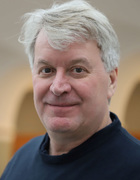
Timothy Eglinton, Full Professor at the Department of Earth Sciences, ETH Zürich (Switzerland), will receive the 2024 Alfred Treibs Award. Presented by the society's Organic Geochemistry Division, the award is given for major achievements, over a period of years, in organic geochemistry. Prof. Eglinton is recognized for his achievements in compound-specific radiocarbon analysis and other areas, which have transformed the field of organic geochemistry and also had a profound impact on various scientific disciplines.
Elements: Metamorphic Duality in SW Japan—The Sanbagawa-Ryoke Classic Example of Paired Metamorphism
April 11, 2024
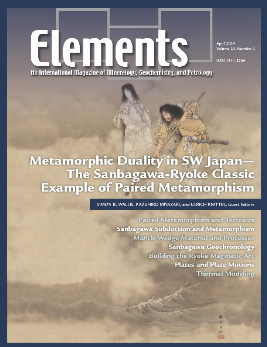
Subduction, where one plate dives beneath another, controls long-term whole-Earth cycling of rocks, fluids, and energy. Plates subduct faster than they heat up, making them the coldest parts of the Earth’s interior. Fluids released from these cold plates rise into hotter overlying rocks, forming magma that feeds surface volcanism. Cold deep conditions associated with subduction complemented by hot shallow conditions under volcanic arcs are reflected in the presence of pairs of metamorphic belts, representing sites of ancient subduction. This issue of Elements guides readers through a premier example of paired metamorphism: the Cretaceous Sanbagawa-Ryoke metamorphic pair of Japan. Estimates of pressure, temperature, the age and duration of metamorphism, and the tectonic framework in which metamorphism took place help us to develop quantitative models—both for the evolution of SW Japan and subduction systems in general.
Current Geochemical Society members can access this issue now via the Elements website using your email address (UserID) and member number (Password).
Hailiang Dong Named Executive Editor of GCA
March 12, 2024
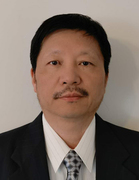
The Geochemical Society and the Meteoritical Society are pleased to announce the appointment of Prof. Hailiang Dong of the China University of Geosciences Beijing as the next Executive Editor of Geochimica et Cosmochimica Acta. He will succeed outgoing EE Jeff Catalano, who has overseen a record number of manuscript submissions and the publication of more than 2,000 papers since 2019. Prof. Dong's term will officially begin on 1 January 2025.
"I am grateful to our authors and reviewers for persevering with us through the COVID-19 pandemic and the barriers that they faced to accessing our journal," said Catalano. Under Catalano's tenure, GCA has witnessed a substantial increase in the gender and geographic diversity of the GCA editorial board, adjusting its membership to better reflect our community. "The greatest strength of GCA is its excellent Associate Editors, who are true leaders in our field," said Catalano. "They provide the critical foundation for ensuring GCA's continued success as the premier journal for fundamental research in geochemistry and cosmochemistry under my esteemed successor, Hailiang Dong."
Prof. Dong brings a wealth of experience relevant to the journal. In addition to being an Associate Editor for GCA since 2016, he has served as Co Editor-in-Chief of Chemical Geology since 2017 as well as for the new journal, Geo-Bio Interfaces, since 2023. He also served as a program manager with the U.S. National Science Foundation from 2014 to 2016.
Prof. Dong completed his B.S. at the China University of Geosciences Wuhan, his M.S. at the China University of Geosciences Beijing, and his Ph.D. at the University of Michigan, where he studied Ar-Ar dating of clay minerals. He then transitioned into a distinguished research career focused on microbe-mineral reactions during a postdoc at Princeton University followed by professorships at Miami University and China University of Geosciences Beijing. His area of expertise is in microbial, environmental, and isotopic geochemistry, including 40Ar/39Ar dating of clay diagenesis; microbially catalyzed mineral reactions; biogeochemical cycling of elements; remediation strategies of contaminants; and medical applications of clay minerals. He is a Fellow of the Geochemical Society and the European Society of Geochemistry and the Geological Society of America.
Donald Canfield Named 2024 Victor M. Goldschmidt Medalist
February 19, 2024
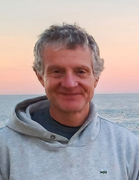
Donald E. Canfield, Professor and DIAS chair at Syddansk Universitet (Denmark) will receive the 2024 Victor M. Goldschmidt Award this August. The Goldschmidt Award is the society's highest honor, presented annually for major achievements in geochemistry over a career. Prof. Canfield is recognized for his reinvention of how to extrapolate sophisticated mechanistic understandings of microbial metabolisms and their elemental and isotopic consequences to elevate our understanding of Earth's environmental and biological history.
Satoshi Utsunomiya Named 2024 Clair C. Patterson Medalist
February 19, 2024
Satoshi Utsunomiya, Associate Professor in the Department of Chemistry, Kyushu University (Japan), will receive the 2024 Clair C. Patterson Award in August. The award is presented annually for an innovative breakthrough in environmental geochemistry of fundamental significance within the last decade, particularly in service to society. Prof. Utsunomiya is recognized for his creative application of advanced techniques, especially electron microscopy and spectroscopy, to the understanding of the environmental mobility of radionuclides, and other elements/particles of concern. His research provides the foundation for estimates of health effects and the development of mitigation/decommissioning strategies.
Jihua Hao Named 2024 F. W. Clarke Medalist
February 19, 2024

Jihua Hao, a Professor in the Department of Geochemistry and Planetary Sciences of the University of Science and Technology of China, will receive the 2024 F. W. Clarke Award this August. The Clarke Award honors a single outstanding contribution to geochemistry or cosmochemistry by an early-career scientist. Prof. Hao is recognized for his work on quantification of early Earth and planetary geochemical conditions and processes. In particular, he developed models of late Archean weathering, river-water chemistry, and the availability of phosphorous on the early Earth and Enceladus.
Elements: Extraterrestrial Organic Matter
February 15, 2024
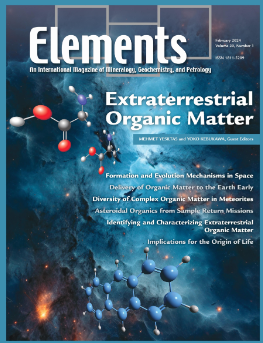
Extraterrestrial organic matter is found in various extraterrestrial environments and in various forms. It forms in a variety of locations through different mechanisms in space. As such, its nature, distribution, formation mechanisms and locations are of particular interest. Some organic molecules are even considered as key players for the emergence of life on Earth and possibly beyond. Therefore, their detection and characterization can contribute to the understanding of the early solar system evolution as well as the origin of life. Despite decades of work and research, there are still many questions and unknowns on this topic. The aim of this issue of Elements is to offer an overview of the concept of extraterrestrial organic matter as well as the latest scientific findings.
Current Geochemical Society members can access this issue now via the Elements website using your email address (UserID) and member number (Password).
Elements: Geometallurgy
January 09, 2024
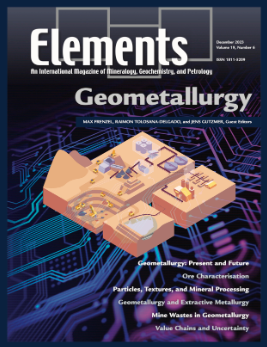
Geometallurgy is an interdisciplinary research field concerned with the planning, monitoring, and optimization of mineral resource extraction and processing. Geometallurgy requires a quantitative understanding of primary resource characteristics such as mineralogical composition and texture, the distribution and variability of these characteristics across the target ore body, and how these interact with mining and beneficiation processes. This requires accurate analytical data for resource characterization, a detailed understanding of ore body geology, process technology, economics, and the often-complex interactions between them. In this issue of Elements, we explore the fundamental concepts relevant to the field. We also review how current geometallurgical research is opening up opportunities for geoscientists to generate better economic and environmental outcomes for the global raw materials industry as part of a sustainable economy.
Current Geochemical Society members can access this issue now via the Elements website using your email address (UserID) and member number (Password).
Elements: Large Igneous Provinces: Versatile Drivers of Global Change
December 13, 2023
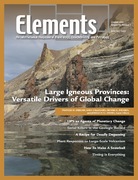
Earth’s history is punctuated by volcanic episodes at a scale never witnessed by humans, known as large igneous provinces (LIPs). These extraordinary volcanic and tectonic events are associated with profound changes to planet Earth, including its climate and habitability. One of the major factors controlling the impacts of LIPs is the cocktail of gases emitted to the atmosphere and oceans. In this issue of Elements, we explore the versatile impacts of LIPs, from their connections to mass extinctions in aquatic and terrestrial environments to climate warming and global icehouse events. This issue also highlights our current understanding of subterranean architectures of LIPs, processes and consequences of interaction between LIP magma and surrounding crustal rocks, and advances in the timing of intrusive events.
Current Geochemical Society members can access this issue now via the Elements website using your email address (UserID) and member number (Password).
Elements: Biomagnetism
October 16, 2023

In this thematic issue of Elements, we look into biomagnetism and the production of magnetic minerals by microorganisms. In popular culture, this may have supernatural connotations; however, in reality, there are many microscopic biological organisms possessing magnetic behaviour owing to their formation of magnetic nanoparticles (MNP) such as magnetite (Fe3O4), maghemite (γ-Fe2O3), and greigite (Fe3S4). We look broadly at the relationship between biogenic MNP formation and biomagnetism: focusing on the mechanisms responsible for these minerals by bacteria; seeking to address whether MNP hold clues to the evolution of life on Earth, and potentially beyond; investigating the contribution of biomagnetism to the biogeochemical cycling of iron; considering the potential application of MNP for industrial remediation; and probing the presence of MNP in multicellular prokaryotes and eukaryotic organisms.
Current Geochemical Society members can access this issue now via the Elements website using your email address (UserID) and member number (Password).